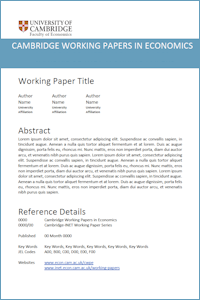
Amano-Patiño, N.
Nutritional Inequality: The Role of Prices, Income, and Preferences
CWPE1909
Abstract: In the U.S., lower income households have a less healthy consumption basket than higher income ones. This paper studies the drivers of such nutrition inequality. I use longitudinal home-scanner data to estimate a demand system on food products, and measure the contribution of prices, disposable income and preferences to nutrition inequality. Disposable income and preferences have a predominant and quantitatively similar role in explaining consumption basket differences across income groups. Instead, prices have a limited effect. Further, I merge nutritional label information to assess, through a series of counterfactual exercises, the effect of income subsidies on nutrition quality. For example, I show that increasing the budget of a low-income household to the average level of the higher income households (a 45% increase in food expenditures) leads to an increase in protein consumption of approximately 5% and a decrease in sugar consumption of approximately 10%.
Keywords: health inequality, grocery demand estimation, food and nutrition policy
JEL Codes: D12 I12 I14 L81 Q18 R20
Author links: Noriko Amano-Patiño
PDF: https://www.econ.cam.ac.uk/research-files/repec/cam/pdf/cwpe1909.pdf 
Open Access Link: https://doi.org/10.17863/CAM.37450
